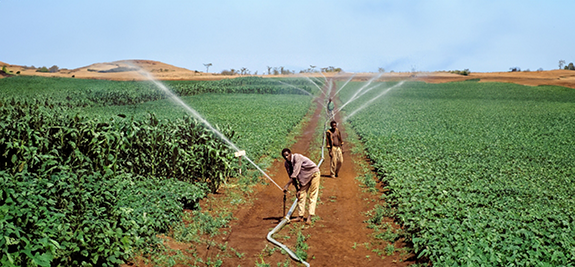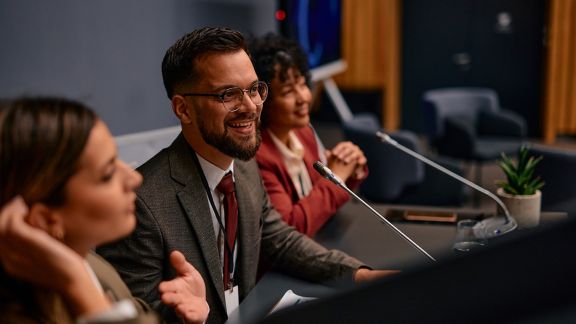Building Evidence for Decision-Making (BE4D)

Problem
USAID, its missions, and partners sometimes struggle to make use of data, evaluation findings, and research.
The U.S. Agency for International Development (USAID) has a long-standing commitment to evidence-based decision making. However, the agency’s Bureaus, Missions, and Operating Units often struggle to use evaluations and research findings to inform policy and programmatic decisions due to time constraints and a lack of capacity and resources. Moreover, evaluations are often not part of the program design phase and, therefore, rigorous methods for evaluation and research are often not used.
USAID provides global assistance for economic growth, expanding partnerships, and innovative solutions to complex development challenges and key U.S. government foreign assistance priorities. To ensure investments have the desired impacts and result in more effective programming to meet government objectives, USAID needs data, evidence, and learning to identify what does and does not work and why. It also needs support in adaptive management and use of evidence for design.
Solution
NORC is leading USAID’s BE4D consortium to promote the use of evidence and data for decision-making that supports U.S. Government foreign assistance priorities and objectives.
NORC is leading USAID’s Building Evidence for Decision-Making (BE4D) Activity consortium, consisting of the Dexis Consulting Group, ECODIT, the International Development Group, the Iris Group, and the Training Resources Group, to promote the use of evidence and data for decision-making. We work in close collaboration with USAID to generate evidence in a systematic manner and support its integration into activity design, implementation, and adaptive management. Our services include:
- Literature and evidence reviews
- Design workshops
- Evaluation design support
- Performance evaluations
- Impact evaluations
- Assessments
- Activity performance management planning support
- Support in data visualization and Geographic Information Systems
- Knowledge management and dissemination
- Trainings and workshops
- Collaborating learning and adapting approaches
Result
BE4D aims to improve the performance, learning, and sustainability of evidence-based development projects and activities.
NORC and its consortium partners aim to improve the performance, impact, and sustainability of evidence-based development projects and activities for USAID Missions and Operating Units working across multiple sectors:
- Education
- Economics and Market Development
- Innovation Technology and Research
- Local, Faith, and Transformative Partnerships
- Private Sector Engagement
Examples of recent projects are the following:
Impact Evaluation of a Women in the Digital Economy Fund Intervention: We are designing and implementing a rigorous impact evaluation to examine the effects of a selected intervention funded by the Women in the Digital Economy Fund (WiDEF) on outcomes related to women’s economic empowerment. WiDEF identifies, directly funds, and accelerates evidence-based, proven solutions to close the gender digital divide with the aim of improving women’s livelihoods, economic security, and resilience.
Research and Analysis of the Global Care Economy: We conducted a rapid landscape analysis to understand how organizations working in the care economy sector globally define, measure, and implement programming. We mapped USAID's care economy-related programming, identified key accomplishments, and uncovered opportunities to advance and strengthen USAID’s future care economy efforts through a systematic analysis of USAID reporting data, complemented by primary qualitative data. This activity is led by NORC consortium partner Iris Group.
Getting Kids to Read in Liberia Impact Evaluation: We are designing and implementing a randomized controlled trail to evaluate USAID/Liberia’s Foundational Skills Activity to assess impacts on enrollment and reading performance of grade one to grade three students. The impact evaluation will also be complemented by qualitative data from classroom and training observations.
Ex-Post Evaluations for Greenhouse Gas Emissions: We are conducting a set of ex-post evaluations to inform USAID’s 2020-2030 Climate Strategy Reporting to support USAID’s Natural Climate Solutions Division under the Bureau for Resilience, Environment, and Food Security. These will estimate greenhouse gas (GHG) emissions reductions in Colombia, India, and Mexico and assess the extent to which GHG emissions reductions and development impacts from past USAID Sustainable Landscapes activities were still occurring in FY22-23 one selected activity in each country. NORC and Ecodit are co-leading this activity.
Impact Evaluation Learning Clinic: We organized an Impact Evaluation Learning Clinic (IE Clinic) for USAID’s Bureau for Planning, Learning, and Resource Management in coordination with the Center for Natural Environment. We addressed critical issues in environment and climate change, with a special focus on biodiversity. The IE Clinic is designed to support USAID field missions to intervene early in activity design to improve the evidence base and to generate learning through the application of rigorous impact evaluation methods. The event was structured around a clinic-based model, offering a comprehensive blend of technical sessions and workshops.
Democratic Republic of Congo (DRC) Food Security Performance Evaluation: This activity supports a performance evaluation for USAID’s Bureau for Humanitarian Assistance (BHA) of three Resilience Food Security Activities in the DRC. The evaluation assesses how each activity has been managed and implemented, its role in improving food security outcomes and strengthening resilience, and progress made towards sustainability.
Tajikistan Learn Together Activity Performance Evaluation: This activity supports the design and implementation of a performance evaluation of USAID/Tajikistan’s Learning Together Activity to assess the relevance and quality of selected interventions with a focus on improving instruction and availability of supplemental reading, math, and socio-emotional learning materials. NORC consortium partner Dexis is leading this activity.
Related Tags
Project Leads
-
Protik Ali
Principal Research ScientistChief of Party -
Alicia Menendez
Senior FellowSenior Staff -
Lauren Persha
Principal Research ScientistSenior Staff -
Ridhi Sahai
Research ScientistEvaluation Specialist










